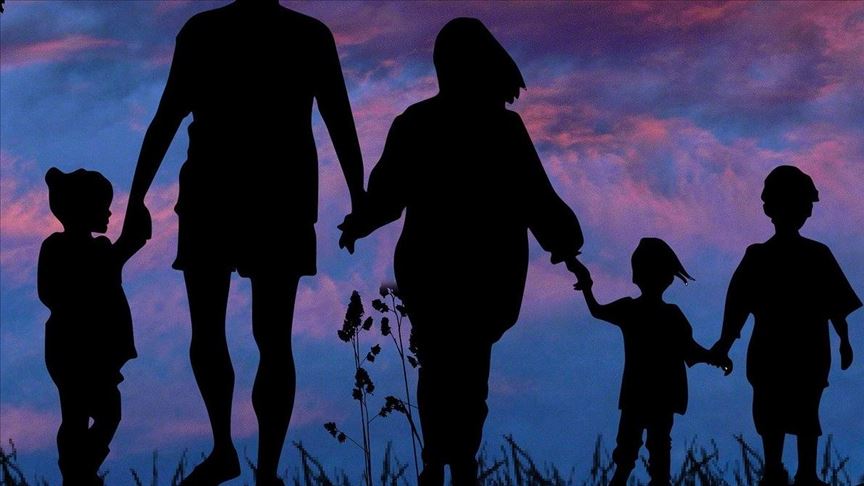'Lockdown may cause behavioral changes among children'
Toddlers and preschool children in particular may not feel safe because of new and uncertain routine: Experts

ANKARA
Children may exhibit behavioral and emotional changes due to the extended lockdown situation in the wake of the coronavirus pandemic, Turkish psychologists have said.
“Especially toddlers and preschool children may not feel safe because they are in a new and uncertain routine. Within this period, children can unconsciously show some regression in their behavior as a coping skill, returning to a developmental stage where they feel safer,” Selin Damla Ozcan said.
Ozcan, an expert on child and adolescent psychology, added that adolescents may feel introverted and unhappy as they are somehow separated from their friends and spend more time with the family at home.
Not all children react the same, she said, stressing the importance of the family's attitude amid the pandemic and the personality of the child.
“In some families, it can also beneficial for children to do child-oriented activities while spending time together at home,” she said, adding that it could be a good opportunity to observe the child's games and behaviors when they are afraid or worried.
Basak Karateke, a psychologist at Ufuk University in Ankara, said that changing routines amid the pandemic is a difficult situation for people of all ages.
“When we look at children, in particular, the areas they will express themselves, the people they will communicate with and the ways of communication are restricted. Numerous options such as going to school, spending time at gardens or parks with friends, going for a walk, hugging, playing games have been firstly restricted for hygiene and then in the form of home quarantine,” Karateke said.
This situation is serious enough to reach the points that may negatively affect children's development processes, she added.
Karateke went on to say that the group that will experience the most difficulties in this process will be the children who have lost a parent as well as the children of healthcare workers.
“Interrupting the relationship with the parent and trying to deal with this emotional loss in quarantine conditions can be an unforgettable experience for these children,” she said.
The children who are left at home alone and have a stimulus deficit are also vulnerable amid the pandemic, she said.
“These children, who cannot experience their needs such as communication and activity appropriate for their age, will likely have a slowdown in all areas of cognitive, emotional, physical and social development,” Karateke said.
Recommendations for healthy mind of child
“Preschool children can express their anxiety and fear most easily in games,” Ozcan said, adding that It is important to follow the games that children set up and direct on their own.
She recommended parents to play games with their children as it could help families to understand what their children are experiencing and concerning.
“Even the 20-minute game time reserved for them at home will be fruitful. The child will feel valued and reinforce the perception of safe space,” she said.
Families with adolescents could prefer board games, charades, and traditional games where all family members can participate, she suggested.
As for adolescents, she believed in the positive effects of dinner-time conversations with the family. She also suggested that families should support their children to be in contact with their friends.
“Telephone or online conversations with close friends will be very useful in terms of a child's mental health and social support needs. Reinforcing these conversations and speaking about friendship and relationships will also strengthen the communication within the family,” she underlined.
She underscored that families must consult a professional in cases of extreme behaviors of their children such as obsession in cleaning, avoiding self-maintenance, tantrums, and self-harm.
“We should always believe in the adaptation power of children. They adapt quickly to existing conditions because they need order. The more applicable or useful the new order is, the easier it is for children to get through this situation,” she added.
Karateke said that being natural in our relationship with children is a pre-condition.
“Instead of giving the child a perception of an unreal world, it is necessary to explain this situation according to his age. Apart from this, excessive information containing unnecessary or inappropriate information, intense and anxious behavior should be prevented, and they should not be exposed to COVID -19 news continuously,” she said.
"The child should have the freedom to ask questions about the pandemic and should know that he will not be deceived. However, when answering the questions, parents should be careful to provide appropriate answers to the child's age and developmental level," she added.
Karateke stressed that we should remind children that hygiene, balanced nutrition and social distancing rules are our power against the virus.
"By creating a fast and natural routine of the new situation that emerged during the quarantine, the child should be offered a perception of a safe environment. When planning these routines, it would be more appropriate to construct an order that is sustainable, responding to the needs of the child, making you feel safe," she added.
She underscored that children have emotions and it is healthy to express them, we should not be afraid of them getting bored, crying, or being angry.
"On the contrary, we have to accept these feelings," she concluded.


